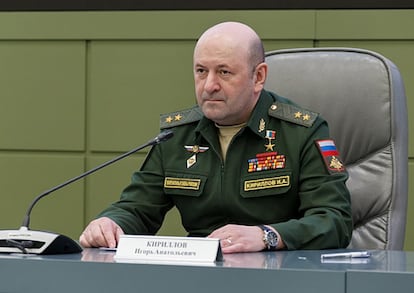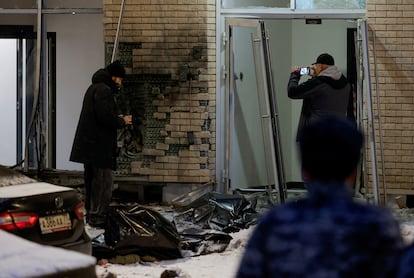Head of Russia’s nuclear defense forces killed in Moscow bomb attack
Igor Kirillov has been reported dead along with his assistant after a device exploded near their official vehicle


A bomb attack in Moscow has killed the head of the Russian army’s Nuclear, Biological and Chemical (NBC) Defense Forces, Lt. General Igor Kirillov, and his assistant. According to Telegram channels close to the Russian security forces, an explosive equivalent to about 300 grams of TNT hidden in an electric scooter went off as the servicemen were walking to their official car in the early hours of the morning. Authorities have not yet clarified responsibility for the attack, the second in less than a week following the shooting death of the designer of the Kh-59 and Kh-69 cruise missiles, Mikhail Shatsky, in the Russian capital. Kirillov was known to be the Kremlin’s voice in accusations against the United States over the never-proven presence of “biolabs” in Ukraine, allegedly preparing biological weapons involving migratory birds and mosquito-carrying drones for dissemination.
Kirillov is the highest-ranking military officer assassinated in Moscow so far during the war in Ukraine. The attack was perpetrated at number 2 Ryazansky Avenue in the capital at 6 a.m. on Tuesday morning. The blast shattered glass from the first to the fourth floors of the building and tore off the front door, Baza news channel reported. Three nearby cars were also damaged. According to the investigation, the orchestrator of the attack must have been nearby and activated the device by means of a radio signal or a phone call.
According to an anonymous source quoted by Reuters, the Ukrainian secret services are believed to have been behind the attack. The Russian Investigative Committee is keeping the investigation open and has not mentioned any of its suspicions about the perpetrators of the attack. Nor has Ukraine. According to the Kommersant newspaper, the initial classification of the crime points to the fact that the case will be tried as the murder of a civilian and not of a military target. In addition, the newspaper’s sources state that the killer and his hypothetical accomplices may also be tried for treason.
On Monday, the Security Service of Ukraine (SBU), which has prosecutorial functions, had filed charges against General Kirillov in absentia for the use of banned chemical weapons, reports Gloria Rodríguez-Pina from Kyiv. According to the SBU investigation, Russia has used this weaponry in more than 4,800 instances since the beginning of the Kremlin’s full-scale invasion in February 2022, according to a statement picked up Monday by the local press. More than 2,000 Ukrainian soldiers have required treatment for chemical poisoning and three have died, according to Ukrainian Colonel Artem Vlasiuk.
Last October, the UK sanctioned Kirillov and his unit for the use of such weapons in Ukraine. Foreign Secretary David Lammy said his country “will not sit by whilst Putin and his mafia state ride roughshod over international law.”

Kirillov, 54, had been in charge of the NBC defense department since 2017. He had also been involved in the creation of the TOS-2 thermobaric rocket launcher, although he gained prominence at the beginning of the invasion when he led the Kremlin’s accusations against Washington over the alleged existence of biological weapons laboratories in Ukraine.
Moscow went so far as to submit a resolution to the UN Security Council on this alleged threat. According to Kirillov, the United States had three dozen laboratories in Ukraine and was preparing mosquitoes, bats, and some migratory bird species to spread yellow fever, dengue fever, and Zika among its enemies. In addition, the Kremlin also accused Washington of designing ethnically distinct pathogens to target only the Slavic population — which, if true, would have been just as dangerous for Ukraine. The Kremlin, which justified its invasion with the “denazification” of Volodymyr Zelenskiy’s government, never proved its accusations and the resolution failed with only Russian and Chinese votes.
Moscow’s allegations were refuted both by agencies specializing in debunking fake news and by Washington. The U.S. State Department stated at the time: “Following the collapse of the Soviet Union, the United States has been working with allies, partners, and international organizations to reduce legacy threats from the Soviet Union’s nuclear, chemical, and biological weapons in former Soviet states, including Ukraine and Russia [...] the Kremlin fails to mention in its disinformation that Russia actively participated in these programs until it unilaterally ceased cooperation in 2014.″
Russian Foreign Ministry spokeswoman Maria Zakharova stressed through her social media channels that Kirillov “worked without fear.” “For many years, systematically, with the facts in hand, he exposed the crimes of the Anglos,” said the senior official before attributing to Washington alleged chemical attacks in Syria, and the attempted assassination in the UK of former Russian spy Sergei Skripal and his daughter. The UN-linked Organization for the Prohibition of Chemical Weapons (OPCW) confirmed London’s version that the former double agent, exchanged by Moscow a decade earlier, was poisoned with the Soviet-origin chemical agent Novichok.
Kirillov’s assassination comes four days after a leading Russian missile designer was found shot dead in a Moscow park near his home. Mikhail Shatsky, chief designer at Mars, had created the Kh-59 and Kh-69 missiles and was involved in the renewal of the drone program with which Moscow has been pounding Ukraine for nearly three years. According to some Ukrainian media, his death was orchestrated by the Ukrainian Defense Ministry’s Intelligence Services, the GUR.
Since the invasion of Ukraine was launched, several Russian public figures have been killed on Russian territory and in the occupied regions with bomb devices attributed to Kyiv. The daughter of Russian ultranationalist philosopher Alexander Dugin, Daria Dugina, lost her life when her car exploded after leaving a festival in which her father was participating in the summer of 2022. According to U.S. intelligence, Ukrainian espionage was behind her death. A year later, a bomb hidden in a statuette killed pro-war blogger Vadim Tatarski during an event at a café, and another explosive wounded Russian writer and paramilitary Zajar Pripelin.
Sign up for our weekly newsletter to get more English-language news coverage from EL PAÍS USA Edition
Tu suscripción se está usando en otro dispositivo
¿Quieres añadir otro usuario a tu suscripción?
Si continúas leyendo en este dispositivo, no se podrá leer en el otro.
FlechaTu suscripción se está usando en otro dispositivo y solo puedes acceder a EL PAÍS desde un dispositivo a la vez.
Si quieres compartir tu cuenta, cambia tu suscripción a la modalidad Premium, así podrás añadir otro usuario. Cada uno accederá con su propia cuenta de email, lo que os permitirá personalizar vuestra experiencia en EL PAÍS.
¿Tienes una suscripción de empresa? Accede aquí para contratar más cuentas.
En el caso de no saber quién está usando tu cuenta, te recomendamos cambiar tu contraseña aquí.
Si decides continuar compartiendo tu cuenta, este mensaje se mostrará en tu dispositivo y en el de la otra persona que está usando tu cuenta de forma indefinida, afectando a tu experiencia de lectura. Puedes consultar aquí los términos y condiciones de la suscripción digital.








































